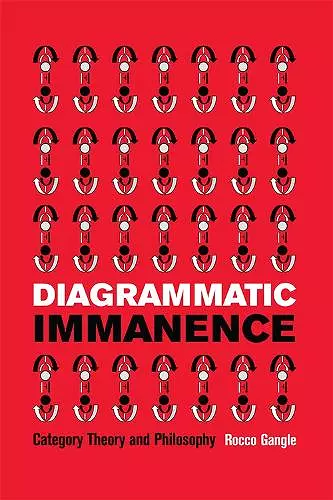Diagrammatic Immanence
Category Theory and Philosophy
Format:Hardback
Publisher:Edinburgh University Press
Published:30th Nov '15
Currently unavailable, and unfortunately no date known when it will be back

Spinoza, Peirce and Deleuze are, in different ways, philosophers of immanence. Rocco Gangle addresses the methodological questions raised by a commitment to immanence in terms of how diagrams may be used both as tools and as objects of philosophical investigation. Gangle integrates insights from Spinozist metaphysics, Peircean semiotics and Deleuze's philosophy of difference in conjunction with the formal operations of category theory. He introduces the methods of category theory from a philosophical and diagrammatic perspective in a way that will allow philosophers with little or no mathematical training to come to grips with this important field.
'Do I believe that category theory and diagrams can be useful to philosophy? Certainly. Does Gangle's book provide an illustration and a useful entry point for philosophers who might want to learn how to use category theory in their own research and thinking? It will depend on their sensitivity to the philosophical issues chosen by Gangle. His presentation of category theory and categorical notational systems are clear and instructive. That will certainly be useful and could be a starting point to non-mathematicians. As to whether, in the end, philosophers will be convinced and will find ways of using these concepts and notational systems in their own philosophical work, I will leave that to readers to decide.' --Jean-Pierre Marquis, Universite de Montreal, Notre Dame Philosophical Reviews. 'This is a philosophical essay whose intended public is composed by philosophers. Nevertheless, for a mathematician it may be of interest because it provides a different, alternative and in some ways provocative view of category theory. In turn, this view hints toward an immanent foundation of mathematics, although the text does not elaborate this line specifically. It is a stimulating way of thinking out of the usual tracks of mathematics, and it could bring new ideas and insights or, perhaps, just provide a critical, non-standard point of view based on a solid philosophical tradition.' --Marco Benini, Università degli Studi dell’Insubria, Zentralblatt MATH
ISBN: 9781474404174
Dimensions: unknown
Weight: 560g
256 pages